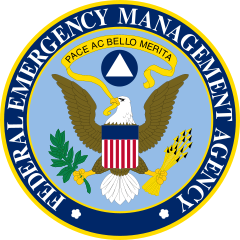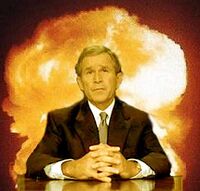Federal Emergency Management Agency
The Federal Emergency Management Agency (FEMA) is an agency of the federal government of the United States. It has responsibility for managing emergencies, planning for emergencies, dreaming about emergencies, and writing huge rulebooks to ensure that the nation deals with emergencies calmly and methodically as homes are being swept down rivers.
FEMA was a key move in the transformation of the U.S. government from a government of strictly limited powers, to one with responsibility for the innumerable things that have not happened yet. As such, it is a repository for thousands of low-productivity individuals that Thomas Jefferson could not have imagined when he ridiculed the post office.
In addition, as it is rare that emergencies fit into the exact categories envisioned by huge rulebooks, FEMA is a recurring flash-point for politicians who wish to caricature an American President as a screw-up. This art was played to perfection during the term of George W. Bush for one obvious reason.
History[edit]
In 1803, a series of devastating fires struck Portsmouth. Congress passed a measure allowing the city's merchants to stall paying for goods. While this was a shadow of the current method of allowing merchants to borrow for free from the Export-Import Bank and letting all their employees go out on Permanent Disability, it was a key step in getting the government into the business of delivering benefits to excuse-makers. That year was the first in which the Wimpy's restaurant chain told a vendor, "I will gladly pay you Tuesday for five tons of hamburger today."
Between 1803 and 1930, a hundred pieces of ad hoc legislation were passed in the wake of disasters. Ad hoc is Latin for a scheme that adds to the number of people in "hock," in this case by making it lucrative to become a deadbeat and blame the weather.
Unfortunately, depending on Congress to pass legislation is fraught with risks, while citizens who have built fancy homes in flood plains demand certainty. Therefore, America's most incompetent Presidents elevated the process of greasing squeaky wheels into a permanent bureaucracy.
- Herbert Hoover initiated the Reconstruction Finance Corporation in 1932, a mere three years after making foreign commerce a crime would make reconstruction a necessity. The RFC loaned nonexistent money to banks to stimulate economic activity. American Presidents have gone back to this particular ink-well with regularity; George W. Bush's tax "rebates" and Barack Obama's American Recovery and Reinvestment Act both assumed that, if there are gobs of hundred-dollar bills floating around, everyone will feel rich enough to spend his own. The third time may be a charm.
- When more tinkering turned a downturn into the Great Depression and led to the election of Franklin D. Roosevelt to administer an antidote that strangely was a double dose of the poison, the Works Progress Administration undertook huge projects, by which the nation could pretend to be prosperous. The WPA built ballparks and large buildings. Mexico still pursues this technique, and with the same disregard for whether there is a need for the structure or are any roads leading to it.
- When America won World War II, there was a hue and cry to do everything on a much larger scale. This led to Housing and Urban Development, an agency that became famous for building high-rise tenements in central cities, and later for dynamiting them.
FEMA itself was created by Presidential Reorganization Plan No. 3 of 1978. Yup, that would be Jimmy Carter, between sucking up to Latin-American dictators and evading Attack Rabbits. Congress had bought the line about him being a peanut farmer, nuclear engineer, and competent; and had given him a blank check to reorganize the Executive Branch. Thus the cohort of bureaucrats whose specialty was planning for the nonexistent finally had a home.
Ad hoc is gone, but Latin returned on the new agency seal shown above. Pace ac bellō merita, literally, "Good works, come hell or high water," indicates that though the agency is fuzzy about what exactly it does, it is prepared to do it continually.
Formal organization[edit]
FEMA's charter is to respond to an emergency that overwhelms state and local governments. As state and local governments are also notoriously overstaffed, these emergencies are few and far between, consigning FEMA employees to remain in Washington, D.C. and the ten district offices, identified by Roman numerals, exchanging memos about what they would do if there were such an emergency.
Moreover, FEMA cannot take charge without a formal request from the Governor of the state experiencing the emergency. Happily, the Governor is as eager to make the President look good as he is to make himself look good — except for the 50% of the time he is of the other political party and is out to make the President look like a buffoon.
The only time the Governor's permission is not needed is when the emergency takes place on federal property, such as when a gunman plans a massacre for a building in which the Feds have helpfully guaranteed that no one will be shooting back; or the emergency that was the Space Shuttle Challenger, although regrettably, no emergency planners could reach the site of that disaster.
Divisions[edit]
FEMA comprises the following major divisions:
- The agency's Mitigation Directorate is a container for massive divisions of make-work, given that Americans understand the word "mitigation" about as poorly as Massachusetts drivers understand the word "yield." The employees of this Directorate, like the reader's local Fire Chief, assume that Americans will not pursue their own best interests without an army of bureaucrats compelling them to do so.
- The Civil Defense Preparedness Agency, the agency that has instructed generations of American schoolchildren to hide beneath their desks to survive a nuclear attack, and which now interrupts television and radio broadcasts with a screech and a synthesized voice every time there is rain in a neighboring state.
- Disaster Relief and Emergency Assistance. Putting these programs on the federal level ensures that permits can be denied for buildings that are not resistant to earthquake or high winds, no matter whether they are ever a problem at the building's location.
- The nation's Flood Insurance program simultaneously pays people if they build homes in insanely risky places and throws up mindless bureaucratic restrictions to get them to abandon their homes instead.
Mother of all emergencies[edit]

Bill Clinton believed that civil liberties were best protected by preventing government departments from communicating with one another, while George W. Bush thought they were better protected by combining departments into huge cabinet agencies with names that no Congressman could ever oppose. This simmering conflict boiled to a head on September 11, 2001, when nineteen toweled heads slammed jetliners into American skyscrapers, an emergency that planners had entirely overlooked, even those in the defense and intelligence agencies.
Suddenly, bullhorn-in-hand, Bush got the upper hand, and lowered FEMA deep inside the new and more secretive Department of Homeland Security. The reorganization meant that actually useful programs involving dam safety took their place alongside vaporware such as weather prediction, "insurance administration," distribution of loot, and "national disaster response coordination." With such shielding from scrutiny, planning for the nonexistent and unpredictable went onto steroids.
FEMA planners worked with other Homeland Security planners to ensure that this emergency could never recur:
- Screeners at the nation's airports ensured that no one could board a plane with box-cutters, tweezers, knitting needles, or Popsicle sticks — though focusing on Swedish grandmothers rather than swarthy young Arab men to avoid seeming racist.
- Fliers' names, and next-of-kin, were entered into a gigantic database so that politicians could immediately know who was missing — and audit their taxes if a relative were a member of the Tea Party movement.
- Weapons were explicitly prohibited aboard flights, to ensure that any conflict were not escalated, and because pilots cannot be trusted with the lives of passengers, except those who want to stick their necks out and sign up for a federal training program on how to be the only pilot at your airline authorized to be armed.
It is a measure of FEMA's success that the September 11 attacks have never recurred in exactly the same way. Of course, the process of planning is never complete, and as terrorists seek different ways of achieving emergencies, planners respond dynamically, with bans on bottles of shampoo and on wearing shoes onto the aircraft, and checks of underpants.
Bush's appointee to run FEMA, Charlie Brown, complained about its transfer inside Homeland Security, saying the move could "shatter agency morale" (as it always does when you tell a bureaucrat no one will ever be able to complain that his planning document is ludicrous) and result in "an ineffective and uncoordinated response" to a terrorist attack or a natural disaster, a matter that "Brownie" would take into his own hands a few years later.
Hurricane Katrina[edit]
It certainly could not have been predicted that the next notorious emergency would have nothing to do with Muslims with box-cutters but rather, high winds and sheets of rain.
FEMA officials sprang into action — something comparable to the mascot at an Eagles game taking flight — and FEMA director Brown pre-positioned disaster response personnel in the vicinity of New Orleans. It was an unforeseeable aspect of the disaster, which could not have been planned for, that telephones at the FEMA branch offices, and even the fluorescent lights, failed to work during the storm, as it was accompanied by a surprise power outage. This meant that FEMA officials could not render direct assistance but merely report on the gathering calamity from the window, and could not actually transmit their reports to anyone who could do anything about it.
Despite these obstacles, FEMA achieved several small successes:
- FEMA procured thousands of small construction trailers to house New Orleans residents rendered homeless by the hurricane. These were assembled at a staging area, twenty miles from the city, to await experts to deal with an unscheduled invasion of mildew.
- FEMA also obtained hundreds of school buses from regions where they had comparatively unimportant tasks. They were driven to New Orleans, where they got as close to the affected communities as they could, given the flooded roads.
Complaints[edit]
Public-policy experts state that every $1 spent on government programs adds more than $1 to the health of the economy. (That must be why we keep doing it.) FEMA is a case-in-point of this tenet, as every $1 spent on FEMA leads to $3 or $4 spent on investigations on how it mismanages every single emergency that occurs. Congressional committees ask questions such as:
- Why was Los Angeles included in the Official Disaster Area even though it was dry and sunny there on the day of the hurricane?
- Why did FEMA pay death benefits and cut checks to mortuaries in emergencies with no reported fatalities?
- Why were hundreds of individuals' claims honored who were nowhere near the Disaster Area?
- Why were all the "reporters" at that FEMA "press conference" actually FEMA employees?
- Have you heard about the great prime rib at the new restaurant in downtown Washington?
FEMA defends itself ably during each Congressional witch-hunt. FEMA executives note that, in many ways, the agency had worked exactly as designed. For example, given the large number of Northern doctors who volunteered to travel to Louisiana to minister to hurricane victims, FEMA mailed each one forms on which the doctors could state their licensing, certification, and post-graduate training in specific flood-related issues. The forms had helpful instructions covering the documentation the doctors needed to submit in order to win FEMA approval. The complete package was usually sufficient to induce the doctors to abandon their offers of help.
Likewise, on plans to ship generators, canned goods, and medical supplies from unaffected areas to the flood victims, FEMA enforced the rules designed to guard against price-gouging and substandard material. After all, FEMA regulations require that key commodities such as tanks of propane and drinking water sell for the same price where it is desperately needed as it sells for in areas where it is virtually jumping out of the ground. FEMA's pre-emptive work surely prevented the majority of scams — perhaps as high a percentage of them as it prevented delivery of authentic aid.
Scapegoats[edit]

The relevant committees of Congress then turned their attention to one of the key design goals of FEMA: the ruination of political careers.
Attention focused on the century-old legislation, mentioned above, that requires the Governor of the afflicted state to invite federal personnel in. Unfortunately, Louisiana Governor Kathleen Blanco was under doctor's orders to take an afternoon nap every day and never responded to President Bush's frantic request for an invitation until three days after the hurricane hit.
New Orleans mayor Ray Nagin — at that point not yet in federal prison — was too busy protecting the "chocolate city" against the threat of "white interlopers." He would join the national chorus that the Cheney-Halliburton cabal planned the hurricane, and planned for the storm waters to take a sharp right turn at the levee to do maximum damage on the Dark side of town.
William "Dollar Bill" Jefferson (D-New Orleans), Louisiana's first African American Congressman since Reconstruction, was criticized for delaying relief efforts to travel to his home in the disaster area and retrieve "a laptop computer, three suitcases, and a box about the size of a small refrigerator." By all accounts, this was not the fridge with $87,000 in bribe money in the freezer, for which Jefferson now also resides at the federal facility at Beaumont, Texas. Fortunately, Louisiana law does not require that he cede his seat in Congress on taking another office.
Next door in Mississippi, just as hard hit by the storm, state disaster relief sprang into action and no one heard anything more about them. This was the month that Governor Haley Barbour sought to prove that a soft-spoken leader with a Southern drawl could inspire citizen confidence — just as the national Chief Executive was proving that such an official could do the exact opposite. Barbour would go on to become national chairman of the Republican Party, as the nation would go on to vote overwhelmingly for the other one.
Fatefully, Bush, just like Kenneth Lay at Enron before him, expressed the total confidence in his organization that he surely felt was his duty. Regarding FEMA chairman Brown, Bush stated, "I'm behind 'Brownie,' one-hundred percent!" while flying aboard Air Force One in search of more school-children who might enjoy having a guy in a suit read fairy tales to them as disaster devoured the nation — a move destined not to appeal to Louisiana residents waist-deep in putrid flood water.
Immediately, Washington was engulfed in debate on whether Bush was too uncaring to be allowed to continue in office, or whether he was simply too stupid to be allowed to continue in office — a debate that continues to this day, even though he is no longer in office, every time the new month's unemployment figures come out.



